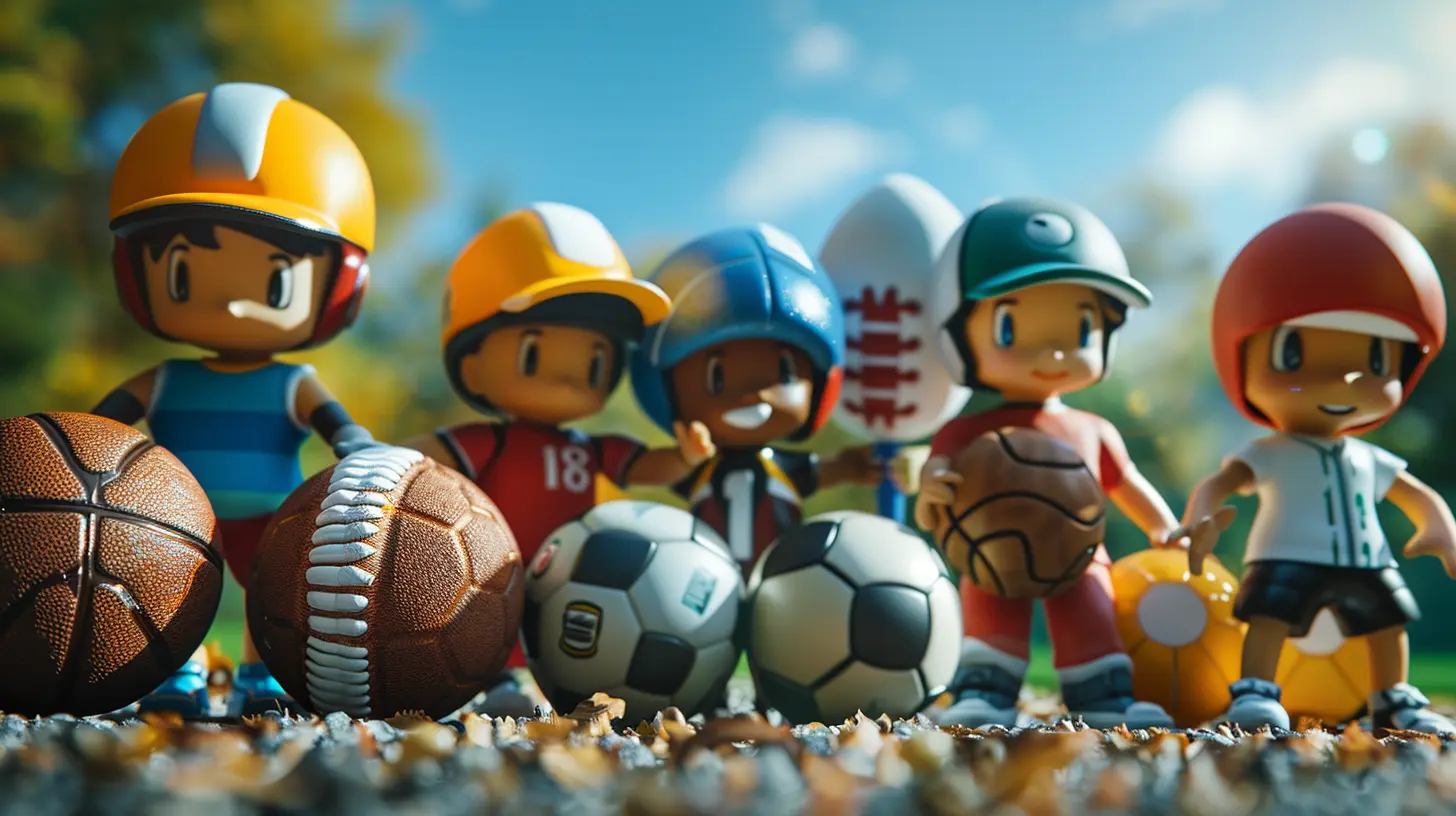How to Create a Lifelong Love of Sports in Your Child
24 July 2025
As parents, we all want our children to grow up happy, healthy, and confident. One of the best ways to foster these traits is by encouraging a love for sports from an early age. But let’s face it—sometimes getting kids to enjoy sports can feel like pulling teeth. It can be frustrating when they’d rather sit with their tablets or watch cartoons than toss a ball around outside.
But creating a lifelong love of sports in your child doesn’t have to be an uphill battle. With the right approach and a little patience, you can instill a passion for physical activity that lasts well into adulthood. So, how do you make this happen? Let’s break it down.

Why Sports Matter
Before we dive into how to nurture that love of sports in your child, let’s take a quick look at why it matters. Sports offer more than just physical benefits like stronger muscles and better coordination. They also teach valuable life skills, such as teamwork, leadership, discipline, and resilience.When kids engage in sports, they learn how to set goals, deal with failure, and push through challenges. It's not just about winning or losing—it's about the lessons learned along the way.
Physical Health
First and foremost, sports are a fantastic way to keep your child physically active. In a world where screen time is at an all-time high, getting kids off the couch and moving is more important than ever. Regular physical activity helps with everything from maintaining a healthy weight to improving cardiovascular health and boosting energy levels.Mental Health
But it’s not just the body that benefits from sports—the mind does too. Studies show that kids who participate in sports are less likely to suffer from anxiety and depression. Physical activity releases endorphins, those “feel-good” chemicals, that can help improve mood and reduce stress.Social Skills
Sports also provide a perfect opportunity for your child to develop essential social skills. Being part of a team teaches them how to work with others, communicate effectively, and build friendships that can last a lifetime. Plus, learning how to navigate both victory and defeat helps build emotional resilience.Now that we’ve got the “why” down, let’s dig into the “how.”

Start Early, But Don’t Push Too Hard
One of the keys to creating a lifelong love of sports in your child is to introduce them to physical activities early. But here’s the catch: you don’t want to push them too hard, too soon. If you come on too strong, your child may start to see sports as a chore rather than something fun.Make It Play, Not Work
Instead of signing your toddler up for structured sports leagues right away, start by incorporating fun, low-pressure physical activities into their routine. Throw a frisbee in the backyard, have dance parties in the living room, or take family bike rides around the neighborhood. The goal here is to associate movement with fun.Young children naturally love to be active. So, rather than forcing them into a rigid sports structure, let them explore different activities in a playful, carefree way. This helps build a foundation of enjoyment that will serve them well once they get into organized sports.

Let Them Choose Their Sport
It might be tempting to steer your child toward the sport you loved as a kid, but resist the urge to impose your preferences. Every child is different, and what worked for you might not work for them. The best way to create a love of sports is to let them choose the one that excites them.Experiment With Multiple Activities
Take some time to expose your child to a variety of sports and physical activities. Soccer, swimming, gymnastics, basketball, martial arts—there’s a wide range of options out there. Attend local games, watch different sports on TV, or even try out a few community classes together.By allowing your child to explore multiple sports, you’re giving them the chance to find the one that truly resonates with them. Maybe they’ll be drawn to the teamwork of soccer, or perhaps they'll prefer the individual challenge of swimming. Encouraging exploration helps them discover what they genuinely enjoy.
Avoid Specializing Too Soon
It’s important not to rush into specialization. While it might seem advantageous to have your child focus intensely on one sport from an early age, this can actually backfire. Early specialization can lead to burnout, overuse injuries, and a sense of pressure that takes the fun out of the game.Instead, encourage a well-rounded experience that allows your child to develop a broad range of motor skills. As they get older, they can start to narrow down their interests naturally.

Be a Positive Role Model
Kids are like sponges—they absorb what they see. If your child sees you enjoying sports and physical activity, they’re more likely to develop a positive attitude toward it themselves.Get Active as a Family
Make physical activity a family affair. Whether it’s a weekly hike, a game of catch, or even a friendly family competition, demonstrate that sports are a fun and integral part of life. When kids see their parents being active, they’re more likely to follow suit.Show Enthusiasm
Even if you’re not the most athletic person, show excitement and enthusiasm for your child’s sports endeavors. Cheer them on from the sidelines, celebrate their achievements, and offer encouragement when they face challenges. Your positive attitude can go a long way in boosting their confidence and love for the game.Focus on Fun, Not Winning
One of the quickest ways to kill a child’s love of sports is to make it all about winning. While competition can be healthy, it’s important to keep the focus on fun and personal growth rather than the scoreboard.Celebrate Effort, Not Just Results
Praise your child for their effort and hard work, rather than just the outcome. Did they give it their all during practice? Did they show good sportsmanship and support their teammates? These are the kinds of accomplishments that matter far more than whether they won or lost.By focusing on effort and improvement, you teach your child that sports are about the journey, not just the destination.
Keep It Light
Avoid putting too much pressure on your child to perform. If they feel like their worth is tied to their performance in sports, they may start to dread it. Instead, keep the atmosphere light and fun. Encourage them to try their best, but let them know that it’s okay to have off days.
Encourage Friendships Through Sports
Sports can be a fantastic way for your child to make friends, and the social aspect is often what keeps them coming back for more.Foster Team Spirit
Encourage your child to form bonds with their teammates. Whether it’s inviting friends over for a post-game pizza party or organizing a playdate with kids from the team, creating a sense of community can make sports more enjoyable.Focus on the Social Experience
Talk to your child about the social benefits of sports. Ask them about their teammates, what they enjoyed about practice, or what funny things happened during the game. By emphasizing the social aspect, you’re helping your child see sports as a fun and inclusive experience, rather than just a performance.Teach the Value of Persistence
Sports are full of challenges, and your child will inevitably face setbacks along the way. Whether it’s losing a game, not making the team, or struggling to master a new skill, these moments can be tough. But they’re also valuable learning opportunities.Emphasize Resilience
Teach your child that setbacks are a normal part of sports—and life. Help them understand that it’s okay to fail, and that the most important thing is to keep trying. When they see mistakes as learning opportunities, they’ll be more likely to stick with sports, even when things get tough.Set Small, Achievable Goals
Help your child set small, achievable goals in their sport. Maybe it’s improving their dribbling in basketball or swimming a little faster each week. By focusing on incremental progress, you’re teaching them the value of persistence and showing them that improvement takes time and effort.
Balance Sports With Other Interests
While encouraging your child to love sports is important, it’s equally crucial to maintain a healthy balance. Not every waking moment needs to be spent on the field or in the gym.Avoid Over-Scheduling
It’s easy to fall into the trap of over-scheduling your child with sports practices, games, and lessons. But too much of a good thing can lead to burnout. Make sure there’s plenty of time for other activities, hobbies, and—of course—rest.Support Their Other Passions
Encourage your child to pursue other interests alongside sports. Whether it’s music, art, or reading, nurturing a variety of passions helps create a more well-rounded individual. Plus, having multiple outlets for self-expression can reduce the pressure they feel in any one area.Conclusion: The Long Game
Creating a lifelong love of sports in your child isn’t something that happens overnight. It’s a long game—one that requires patience, encouragement, and flexibility. The key is to make sports fun, let your child find their own path, and support them every step of the way.Remember, it’s not about raising an Olympic athlete. It’s about helping your child develop a love for physical activity, teamwork, and perseverance that will serve them well throughout their life.
So, lace up those sneakers, grab a ball, and get ready to embark on this journey together. Your child’s lifelong love of sports is just around the corner.
all images in this post were generated using AI tools
Category:
Youth SportsAuthor:

Uziel Franco
Discussion
rate this article
1 comments
Nico Hodge
Great article! Instilling a lifelong love of sports in children is so important for their physical and emotional growth. Your tips are practical and inspiring—perfect for nurturing young athletes. Keep up the fantastic work!
August 6, 2025 at 11:41 AM

Uziel Franco
Thank you so much for your kind words! I'm glad you found the tips helpful in nurturing young athletes. Your support means a lot!

![Beyond the Stats: The Leadership of [Player Name] On and Off the Field](/pictures/blog/small/beyond-the-stats-the-leadership-of-player-name-on-and-off-the-field_1.webp)
